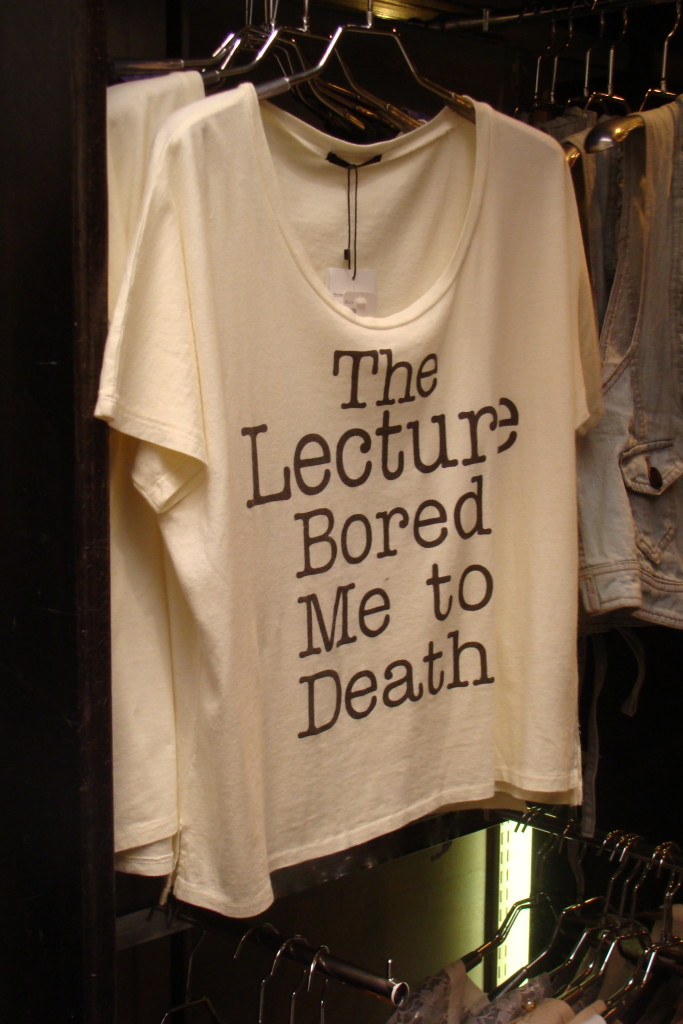In an age where learners can download all of the content they want for free, there is limited value in continuing to feed them a pre-digested, pre-prepared curriculum. The institutions that will thrive in our age of digital hyperconnectivity will do so because of the quality and depth of the learning experiences they offer, the relationships that they foster, the networks that they broker, and their bespoke content generation (research).
I’ve been waiting to put the above two sentences into an academic article for a few months now. I haven’t finished writing the article yet (still!), so here it is in all its opinionated glory.
This is part 1 of a 3-part (I think) discussion.
In just about all of the university courses I know of, we continue to teach students using an ‘industrial model’ – that is, we pre-package content that we think is relevant, and then transmit it to learners. Often this is via lectures (or, in the modern teaching world, online recorded lectures for maximum efficiency (although its questionable whether online recorded lectures are actually very effective. But I digress). However, in an era of MOOCs, Youtube, Slideshare and Lynda.com, to mention a few, the digital world is awash in content. We teachers like to think that the lecture content we’re preparing is unique and better than anyone else’s, but in reality this nearly always isn’t the case. So the first point is that we’re spending a lot of time making and packaging learning materials, when there is a lot of existing content out there already that most of us don’t access or use (cue discussion for another day: how do teachers become effective curators of learning?)

What good teachers can say in our defence is that we tweak and optimise the content we make for the particular cohorts we’re teaching. We create learning experiences around the content that are designed carefully to engender deep learning in the cohorts we’re engaging with. This is pretty cool – one of the best reasons that teachers exist. However, this argument doesn’t address why we are spending too much time making redundant powerpoints in the first place. I guess some teachers might say that in the time it would take them to identify suitable open content online and tailor it for the cohort that they may as well have built the materials from scratch… in response though, I’d humbly suggest that sometimes this is because university teachers aren’t as well networked as they could be, and don’t know where or how to look.
I also wonder why we would WANT to spend a lot of time searching for and retrieving learning materials, filtering them and then making them relevant and useful to students, when information literacy and lifelong learning are key graduate capabilities. Students are going to need to do all of this themselves in an ongoing way for the rest of their lives. Why not start them off while they’re at uni? Yes, I’m talking about research and enquiry-based learning. Why don’t we as teachers spend less time focussing on content delivery, and more time and energy doing what we add the most value doing – creating learning experiences and facilitating learning? Don’t get me wrong — I’m not saying that ALL learning experiences at uni need to involve students doing their own research. Some types of content do lend themselves to a direct transmission approach (e.g., TED talks, which are specific genre of direct transmission teaching).
As I finish part 1 of this post, I wonder whether our collective addiction to content delivery comes from an (erroneous) belief held by both learners and teachers around what ‘quality’ and ‘effort’ is in teaching. Do we assume that because the teacher has spent hours on lecture slides and preparing readings that the learning experience is a high quality one? Would students ask whether they were getting value for money if the teacher provided less pre-digested content and instead focussed their efforts on supporting and facilitating the learners to find both questions and answers themselves? How scary might it be for a teacher to go in without the ‘safety blanket’ of their slide pack and talking points?